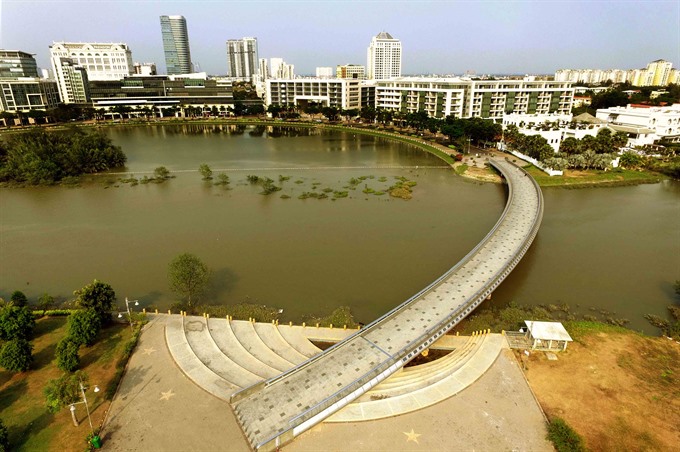 Politics & Laws
Politics & Laws

The National Assembly yesterday expressed concerns about the transition of regulations on planning and the handling of current regulations when discussed the draft Law on Planning.
 |
| A part of the Phu My Hung new urban area in District 7 of HCM City. The master plan of the area was selected by the American Institute of Architects as the best in Asia in 1997. — VNA/VNS Photo An Hieu |
HÀ NỘI – The National Assembly yesterday expressed concerns about the transition of regulations on planning and the handling of current regulations when discussed the draft Law on Planning.
Deputy Hoàng Văn Cường from Hà Nội, said that while planning must be adjusted to fit changes in society, he was worried that these adjustment might be conducted due to the subjective will of leaders.
“The Law provides six bases for revising the plan but the rules are very general. For example, according to the draft law, changes will be made when there is an adjustment of objectives of the socio-economic development strategy or abnormal changes of the socio-economic situation. However, in the current socio-economic environment, such regulations could be very easily used as an excuse for changes if those in charge of a specific sector want to adjust," he said.
He suggested the drafting body clarify the criteria for adjusting the plan more specifically so that adjustments don’t depend on the subjective will of experts or managers.
Regarding construction planning, NA deputies said that it needs to be integrated into the national master planning law based on current regulations to avoid unnecessary disturbances.
As explained by the Standing Committee of the National Assembly, for construction planning and planning of specific functional areas, the current provisions of the Law on Construction include four areas: regional planning, urban planning, specialised area planning and rural planning.
The report presented by Vũ Hồng Thanh, Chairman of the NA Economic Committee, said that after consulting with ministries to ensure the consistency of regulations, the Government would let the specialised management body (the Ministry of Construction) integrate regulations on urban planning and rural planning to national master planning.
NA Deputy Nguyễn Sỹ Hội, from Nghệ An Province, said the draft law ignored maritime planning.
"Maritime planning has a very important role in national security, but the law hardly touched upon it and no specific body has been assigned for this matter," he said.
“The task of building a strong maritime defence system should be done properly, and I think maritime planning must be a major part,” he said, adding that there must be a body assigned with maritime space planning.
In terms of airspace planning, Thanh from the NA Economic Committee, said no country had developed its own plan for airspace.
“Current planning deals only with the allocation and arrangement of space including on the ground, underground and in the air to a certain height in accordance with international treaties,” he said.
“But we have included a provision on this matter, the “Guidance on the exploitation and management of airspace”. The Government will have to guide this regulation in detail", Thanh said.
Meanwhile, deputy Tô Văn Tám from Kon Tum Province, said the draft law needed to make sure it has tight principles so that interest groups don’t influence planning.
Deputy Lê Công Đỉnh from Long An Province agreed with this, saying that the draft law must be specific on acts of corruption as stipulated in the Law on Corruption Prevention and Fighting.
A total of 32 current laws are to be amended once the Planning Law is passed, of which only four have to be overhauled while the rest need small changes. Therefore, the Ministry of Planning and Investment suggested promulgating an omnibus law to amend 178 articles and clauses of the 28 laws concurrently with the Planning Law.
The other laws could be revised one after another to ensure enforcement of the Planning Law in early 2019.
Tackling bad debts
On the same day, deputies discussed the draft resolution on handling bad debts of credit institutions; the draft amended Law on Credit Institutions.
Deputy Đặng Ngọc Nghĩa from Thừa Thiên – Huế Province, suggested reviewing the exact total of bad debt and find the cause of the bad debts.
Deputy Cấn Văn Lực, also a financial and banking expert, said that there should be a law on bad debt management.
Deputy Lê Xuân Nghĩa, a member of the National Financial and Monetary Policy Advisory Council, said that the longer it took to sort out bad debts, the more damage is caused to the economy.
Nguyễn Văn Bình, former governor of the State Bank of Việt Nam, Chairman of the Party Central Committee’s Commission for Economic Affairs, said the banking system and the law made significant progress over the past 10 years, but legal foundations were not consistent, making handling bad debt difficult.
"I remember NA deputies saying bad debt is like a blood clot, that image is very accurate: if it is a mild case, we can cure it; but if it’s a serious one, we will die. We can’t let bad debts accumulate but have to tackle them continuously,” he said.
Regarding the resolution, Bình said as a banker, he was surprised that the draft resolution was only applicable to bad debts incurred by December 2016.
"Any bad debt is bad debt. Whenever they arise, yesterday, today or tomorrow, they are still bad debt. If we make such a regulation, does that mean we’re doing a favour to old bad debts?” he asked.
Bình said there should not be regulations on any specific date for tackling bad debt.--VNS








